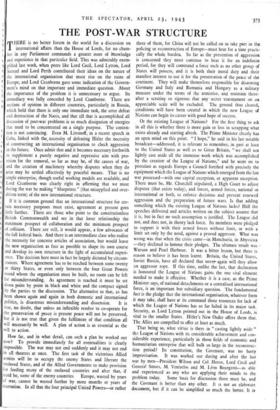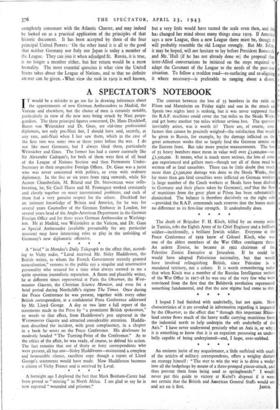. THE POST-WAR STRUCTURE
rp HERE is no better forum in the world for a discussion on
I y r
international affairs than the House of Lords, for no cham- ber in any Parliament commands a greater store of knowledge and experience in that particular field. This was admirably exem- plified last week, when peers like Lord Cecil, Lord Lytton, Lord Samuel and Lord Perth contributed their ideas on the nature of the international organisation that must rise on the ruins of Europe, and Lord Cranbome gave some indication of the Govern- ment's mind on that important and immediate question. About the importance of the problem it is unnecessary to argue. Its immediacy was fully conceded by Lord Cranbome. There are sections of opinion in different countries, particularly in Russia, which hold that there is only one immediate task, the utter defeat and destruction of the Nazis, and that till that is accomplished all discussion of post-war problems is so much dissipation of energies that need to be concentrated on a single purpose. The conten- tion is not convincing. Even M. Litvinoff, in a recent speech in Cuba, linked with the, necessity of defeating Hitler the necessity of constructing an international organisation to check aggression in the future. Once admit that and it becomes necessary forthwith to supplement a purely negative and repressive aim with pro- vision for the removal, so far as may be, of the causes of war, and the creation of machinery whereby disputes when they do arise may be settled effectively by peaceful means. That is no simple enterprise, though useful working models are available, and Lord Cranbome was clearly right in affirming that we must during the war be making " blueprints " (that misapplied and over- driven term) of the new international structure.
If it is common ground that an international structure for cer- tain necessary purposes must exist, agreement at present goes little further. There are those who point to the constitutionless British Commonwealth and see in that loose relationship the maximum prospect of collaboration and the minimum prospect of collision. There are still, it would appear, a few advocates of the full federal basis. And there is an intermediate class who realise the necessity for concrete articles of association, but would leave the new organisation as free as possible to shape its own course and develop its own structure in the light of accumulated experi- ence. The decision here must in fact be largely dictated by circum- stances. Where agreement has to be reached between some twenty or thirty States, or even only between the four Great Powers round whom the organisation must be built, no room can be left for misunderstanding. As agreement is reached it must be set down point by point in black and white and the compact signed by the parties to the discussion. The alternative to that, as has been shown again and again in both domestic and international politics, is disastrous misunderstanding and dissension. It is true, no doubt, that unless an inflexible resolve to co-operate for the preservation of peace is present peace will not be preserved, but it is not true that given the fulfilment of that condition all will necessarily be well. A plan of action is as essential as the will to action.
How far, and in what detail, can such a plan be worked out now? To provide immediately for all eventualities is dearly impossible. The war may not end suddenly and it may not end in all theatres at once. The first task of the victorious Allied armies will be to occupy the enemy States and liberate the enslaved States, and of the Allied Governments to make provision for feeding many of the enslaved countries and after that, if need be, some of the enemy countries. Europe, wasted by years of war, cannot be wasted further by more months or years of starvation. In all that the four principal United Powers—or rather three of them, for China will not be called on to take part in the policing or reconstruction of Europe—must bear for a time practi- cally the whole burden. So far as the prevention of aggression is concerned they must continue to bear it for an indefinite period, for they will command a force such as no other group of States will possess, and it is both their moral duty and their manifest interest to use it for the preservation of the peace of the continent. They will make themselves responsible for disarming Germany and Italy and Rumania and Hungary as a military measure under the terms of the armistice, and maintain there- after a scrutiny so rigorous that any secret -rearmament on an appreciable scale will be excluded. The ground thus cleared, conditions will have been created in which the new League of Nations can begin its career with good hope of success.
Or the existing League of Nations? For the first thing to ask in all this is whether there is more gain or loss in scrapping what exists already and starting afresh. The Prime Minister clearly has an open mind on this point. " I hope," he said in his last notable broadcast—addressed, it is relevant to remember, in part at least to the United States as well as to Great Britain, " we shall not lightly cast aside all the immense work which was accomplished by the creation of the League of Nations," and he went on to postulate as regards Europe a Council fortified with precisely the equipment which the League of Nations which emerged from the last war possessed—with one capital exception, or apparent exception. There must be, Mr. Churchill stipulated, a High Court to adjust disputes (that exists today), and forces, armed forces, national or international or both, to enforce decisions and prevent renewed aggression and the preparation of future wars. Is that adding something which the existing League of Nations lacks? Half the speeches delivered and articles written on the subject assume that it is, but in fact no such assumption is justified. The League did not, and does not, in theory lack force. Its members were pledged to support it with their armed forces without limit, or with a limit set only by the need, against a proved aggressor. What was wrong was that when the crisis came—in Manchuria, in Abyssinia —they declined to honour their pledges. The ultimate result was Warsaw and Pearl Harbour. It was a bitter lesson, but there is reason to believe it has been learnt. Britain, the United States, Soviet Russia, have all declared that never- again will they allow an aggressor rope. If this time, unlike the last, that declaration is honoured the League of Nations gains the one vital element needed to make it effective. Whether it is a case, as the Prime Minister says, of national detachments or a centralised international force, is an important but subsidiary question. The fundamental fact is the pledge that the international organisation, whatever form it may take, shall have ar its command those resources for lack of which the League of Nations has so far failed in its major task. Security, as ,Lord Lytton pointed out in the House of Lords, is vital to the smaller States. Hider's New Order offers them that. The Allies are compelled to offer at least as much.
That being so, what virtue is there in " casting lightly aside " thz League of Nations with its considerable achievement and con- siderable experience, particularly in those fields of economic and humanitarian enterprise that will bulk so large in the reconstruc- tion period? Its constitution, the Covenant, was no hasty improvisation. It was worked out during and after the last war by men—President Wilson and Col. House, Lord Cecil and General Smuts, M. Venizelos and M. Leon Bourgeois—as able and experienced as any who are applying their minds to the problem today. Some basis for discussion there must be, and the Covenant is better than any other. It is not an elaborate document, but if it can be simplified so much the better. It is completely consonant with the Atlantic (garter, and may indeed be looked on as a practical application of the principles of that historic document. It has been accepted by three of the four principal United Powers:—On the other hand it is all to the good that neither Germany nor Italy nor Japan is today a member of the League. They can join it when adjudged fit. Russia, it is true, is no longer a member either, but her return would be a mere formality. The most essential question is what view the United States takes about the League of Nations, and to that no definite answer can be given. -What view she took in 1919 is well known, but a very little would have turned the scale even then, and she has changed her mind about many things since 1919. If America says a new League, then a new League there must be, though it will probably resemble the old League strongly. But Mr. Ed2n. it may be hoped, will not hesitate to lay before President Roose‘,:it and Mr. `Hull (if he has not already done so) the proposal that inter-Allied conversations be initiated on the steps required to adapt the Covenant of the League to the needs of the post-war situation. To follow a trodden road—re-surfacing and re-aligning it where necessary—is preferable to ranging about a desert.



























 Previous page
Previous page